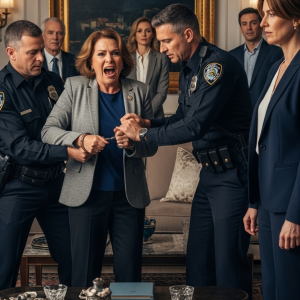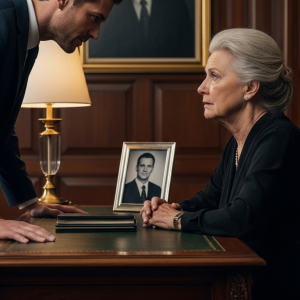Colonel James Sterling, retired from the U.S. Army Special Forces, had transitioned into civilian life with the same ruthless efficiency that had defined his military career. He had built Sterling Industries from the ground up, transforming a small logistics company into a corporate titan. His boardroom was run like a command center, his strategies were executed like field operations, and he assessed every person he met for their strengths and, more importantly, their weaknesses.
His daughter’s husband, Mark, was a man composed almost entirely of weaknesses. Mark was a creature of lavish tastes and shallow ambitions, perpetually chasing a lifestyle he couldn’t afford, funded by a series of failed business ventures and a spiraling gambling addiction. He saw his father-in-law not as a man to be respected, but as a walking vault to be cracked.
The tension between the two men was a constant, low-frequency hum in the life of Jessica, Sterling’s daughter. She loved her father for his strength and stability, but found him emotionally distant. She loved her husband for his charm and affection, but was willingly blind to the rot of desperation beneath his easy smile. She saw Mark’s financial troubles as bad luck, not bad character.
A week before the incident, Mark had made a final, desperate play. He had requested a private meeting in Sterling’s home office, a room that was less a study and more a personal museum of a dangerous life. Medals, including a Distinguished Service Cross, were displayed in a glass case. A decommissioned M4 rifle was mounted on the wall above a collection of tactical knives. It was a room that screamed a history Mark was too self-absorbed to read.
“Sir, I have a new venture,” Mark had started, his voice slick with rehearsed confidence. “It’s a guaranteed success. I just need a short-term loan to get it off the ground. Five hundred thousand should do it.”
Sterling had listened without expression, his steepled fingers hiding the contempt in his eyes. When Mark finished, the Colonel’s response was swift and surgical. “No. I don’t invest in failing operations, Mark. And a man who cannot manage his own finances is a failing operation. The discussion is over.” The dismissal was absolute, leaving no room for argument. Mark had left the office with a humiliated fury in his eyes, the final seed of his disastrous plan now sown.
A week later, James Sterling was reviewing quarterly reports when his daughter’s frantic call came through. He arrived at their shared home to find Jessica in a state of hysterical collapse, clutching a phone. On the screen was a video file that had been sent from an anonymous number.
The video was shaky and poorly lit. It showed Mark tied to a chair, his face a mask of what was supposed to be terror. A cheap-looking pillowcase was tied around his head as a blindfold, and duct tape covered his mouth. Two figures in black hoodies and ski masks stood behind him, one holding a pistol to his head. A distorted voiceover, clearly altered by a cheap app, laid out the demand: $500,000 in non-sequential bills, or Mark would be killed.
Jessica was inconsolable. “Dad, we have to pay them! We have to do whatever they say!” she sobbed, collapsing into his arms.
Sterling held his daughter, his expression a perfect mask of fatherly concern. But inside, his mind was not that of a grieving father. It was the mind of Colonel Sterling, running a cold, instant analysis of a hostile situation. He watched the video again, his eyes missing nothing. And what he saw was not a professional kidnapping; he saw a pathetic, amateur theatrical production.
He noted the flaws with the speed of a computer. Flaw #1: The knot used to tie the rope around Mark’s chest. It was a granny knot, loose and inefficient, a knot a Boy Scout would be embarrassed to tie. Flaw #2: The gun. The man on the right held it with no tactical discipline, his finger amateurishly on the trigger. He could also see, for a split second, the bright orange tip of the barrel, the tell-tale sign of an airsoft replica.
Flaw #3: Mark’s performance. His breathing was too regular, his chest rising and falling in a steady rhythm. A truly terrified person would be hyperventilating. But the most damning flaw, the one that made Sterling’s blood run cold with contempt, was the background. Behind Mark’s head was a section of exposed brick wall, marked with a distinctive pattern of water stains. It was the east wall of Warehouse 7 in the old industrial park on the edge of town—a property Sterling Industries had owned for twenty years.
He comforted his daughter, his voice calm and steady. “It’s going to be okay, Jessie. I’ll handle this. I’ll get your husband back.” He was, in fact, telling the truth. He was going to get Mark back. And he was going to do it himself.
As soon as Jessica was calmer, Sterling retreated to his office and closed the door. His first instinct was to handle it himself, quietly and permanently. But this was not some lawless foreign territory. This was his home, and his daughter’s entire life was about to be torn apart. The situation required not just force, but a certain degree of theater and incontrovertible legal proof.
He made a single phone call, not to 911, but to the private cell number of Ben Carter, the current Commander of the State Police SWAT team. Carter had served under Sterling in the army two decades ago and revered his old Colonel.
“Ben, it’s Sterling,” he said, his voice devoid of panic. “I have a situation. It’s a kidnapping, but it’s a fabrication. My son-in-law is the architect.” He quickly outlined the evidence. “I’m not reporting a crime, Ben. I’m proposing a joint field operation. I want to let this play out. I want to catch him in the act, red-handed, with no plausible deniability.”
On the other end of the line, there was no hesitation. “Understood, Colonel. We’ll do it your way. Just tell us the when and where.”
An hour later, Sterling received a call from the “kidnapper.” It was Mark, his voice disguised by a cheap voice-changer, attempting to sound menacing. “Did you get our video, old man? Five hundred thousand dollars. No cops, or he dies.”
Sterling summoned a lifetime of tactical experience and played his part perfectly. He let a tremor enter his voice. “Please… please don’t hurt him,” he stammered, sounding like a terrified, elderly father. “I have the money. Just tell me what to do. I’ll do anything you say.” He haggled over the details, not to save money, but to make his performance believable, all while feeding Mark’s ego, letting his son-in-law believe he was in complete control.
They settled on a drop point: the top level of a multi-story parking garage downtown, a place known to be deserted after business hours. As Sterling was on the phone, feigning panic, a very different scene was unfolding across town.
A team of twelve SWAT officers, dressed in black tactical gear, were conducting a silent, methodical sweep of the designated parking garage. They moved like shadows, rappelling down from the roof, securing stairwells, and setting up sniper overwatch positions in the buildings opposite. Commander Carter, listening to a live feed of Sterling’s call, directed his men with hand signals. The trap was being set, and the bait, a terrified old man on the phone, was luring the prey directly into it.
The top level of the parking garage was an ocean of concrete and shadows, lit by the weak, orange glow of a few sodium lamps. A single, aging sedan, driven by Sterling himself, entered and parked in the center of the vast, empty space. He got out, placed a heavy black duffel bag on the ground as instructed, and then drove away, his tires echoing in the silence.
From the shadows behind a concrete pillar, Mark and his two hired accomplices watched the car leave. They were masked and armed with their replica pistols. Mark’s heart was pounding with a mixture of adrenaline and triumph. It had worked. The old man had folded just as he’d expected.
“Easy money,” one of his accomplices whispered, nudging him. “Let’s grab the bag and go.”
They stepped out from behind the pillar, moving quickly towards the duffel bag. It was the moment of victory. Mark reached down to grab the handle.
CLICK. FWOOM.
In an instant, the world erupted in blinding light. Every floodlight on the roof of the garage, previously dormant, blazed to life, turning the shadowy expanse into a scene as bright as daylight. Simultaneously, a dozen brilliant red dots appeared, unwavering, on the chests of Mark and his two friends. They froze, their hands half-raised, caught like insects in a spotlight.
From the darkness of the garage’s access ramp, a figure emerged. It was not a police officer. It was James Sterling. He was not dressed as a victim, but as a commander, his posture erect, his face an unreadable mask of cold fury. He raised a bullhorn to his lips.
The sound of his voice, amplified and utterly devoid of fear, boomed across the concrete landscape.
“Mark.”
The name hit his son-in-law like a physical blow. Mark stumbled back, his eyes wide with disbelief behind his ski mask.
“Your little theatrical production had seven fatal flaws,” Sterling’s voice echoed, each word a hammer blow of judgment. “Your first, and most significant, was choosing me as your audience.”
He took another step forward, the SWAT snipers tracking his every move.
“Flaw number two: that granny knot. Flaw number three: using an airsoft gun and failing to conceal the orange tip. Flaw number four: your over-acted, poorly-timed panic. Flaw number five: your choice of location—a warehouse I have owned for twenty years.”
He paused, letting the weight of the methodical deconstruction crush his son-in-law.
“Flaw number six: using a predictable, easily-traced voice modulation app. And flaw number seven, the most insulting of all… you truly believed I was just a tired old man with a checkbook.”
He lowered the bullhorn. The silence was absolute.
“This operation is over. Drop your weapons. Now.”
The response was immediate and overwhelming. From every shadow, from every corner, the SWAT team emerged, a silent, black-clad wave of professional force. Mark and his accomplices, paralyzed by the shock and the laser sights dancing on their chests, dropped their fake guns, which clattered pathetically on the concrete. They were on their knees, hands on their heads, before they could even process the totality of their failure.
The “destruction” of Mark was not violent; it was a quiet, brutally efficient process of humiliation. He was cuffed, and a SWAT officer pulled the ski mask from his head. He was forced to look up and meet the eyes of his father-in-law. There was no anger in Sterling’s face, no satisfaction. There was only a profound, bottomless contempt. In that moment, Mark didn’t just feel like a failed criminal; he felt like a foolish child who had been caught playing a stupid, pathetic game.
The ride to the police station was a silent descent into the ruins of his life. He knew everything was over. The charges—extortion, conspiracy, filing a false police report—would be the least of it. He had not just committed a crime; he had committed the unforgivable sin of underestimating the Colonel.
The most difficult part was the phone call Sterling made to Jessica from the station, with Mark sitting in an interrogation room nearby. He told her the truth, calmly and precisely, laying out the evidence and the confession he knew was coming. He did not soften the blow. He delivered the facts like a field report, knowing that the only way to heal a wound is to first clean it, no matter how much it hurts. The sound of his daughter’s heartbroken, disbelieving sobs over the phone was the only thing that caused a flicker of pain to cross the Colonel’s stoic face.
In the end, Mark and his accomplices confessed to everything. The evidence was absolute, the trap had been perfect. The legal system would deal with them. For James Sterling, the operation was over, but a new mission was just beginning: rebuilding his daughter.
Jessica’s world was shattered. The man she loved was a liar and a criminal. Her marriage had been a fraud. The grief and betrayal were immense, but beneath them, for the first time, a seed of her father’s strength began to take root. She had been freed from a toxic lie, albeit in the most brutal way imaginable.
The final scene took place a month later. Jessica was in her father’s office, the room she had once found intimidating. But now, she looked at the medals and the artifacts not as symbols of a distant, violent past, but as testaments to the resilience and strategic mind of the man who had protected her.
Sterling was not talking to her about her feelings. He was spreading the financial reports of Sterling Industries across his desk. “Your husband’s shares in the company have been legally forfeited,” he said, his tone matter-of-fact. “They revert to you. Which means you are now a majority shareholder. You need to learn how this works. You need to learn how to protect it.”
He began to explain the intricacies of their corporate structure, the vulnerabilities in their supply chain, the threats from their competitors. He was not coddling her. He was training her. He was teaching her to see the world as he saw it: a landscape of threats and opportunities that required vigilance, intelligence, and strength.
“The most important lesson is this,” he said, looking her directly in the eye. “Never underestimate your opponent. But more importantly, never underestimate yourself.”
He had not just exposed a crime and saved his fortune. He had surgically removed a cancer from his daughter’s life and, in doing so, had finally begun the process of empowering her, of passing on not just his wealth, but the true legacy of a survivor. The Colonel’s last, most important mission had just begun.




